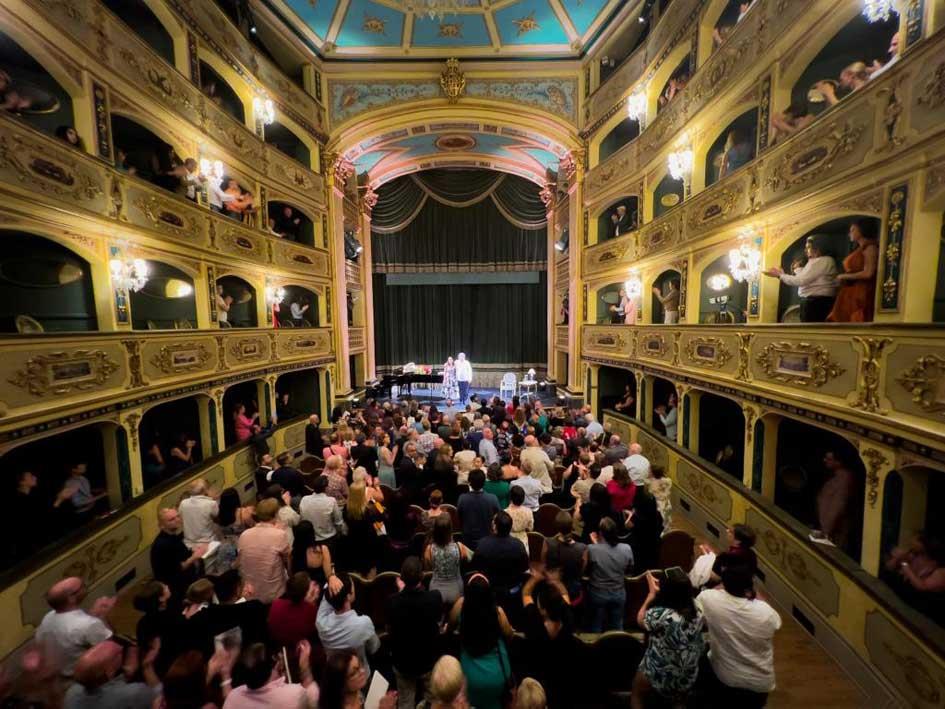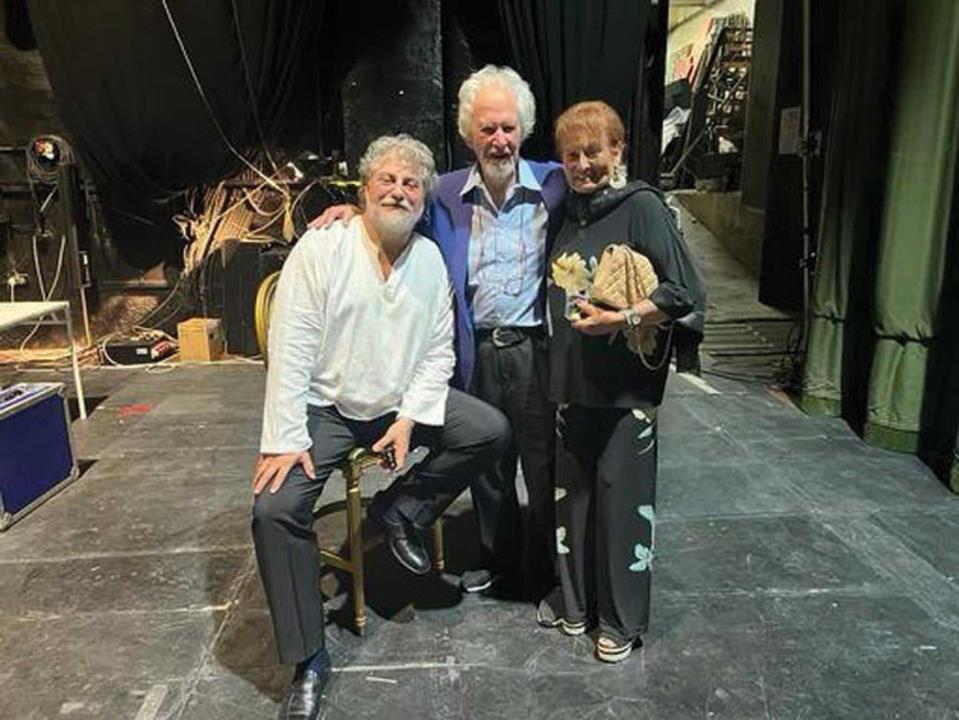This was an unusual evening, with three languages used simultaneously. But before saying more about the evening I thought the lineup outside the theatre before the performance a nice touch. It is always a pleasure to meet those who are working behind the scenes. I was able to say Hello to Dr Michael Grech, Chairperson of the Manoel Theatre's Board of Management whom I had not met for over two years, and CEO Massimo Zammit, a new name, with whom I have corresponded but never met. Also Catherine Tabone, the enthusiastic CEO of the Valletta Cultural Agency. There were other important members of the team whose names I am not sure of.

In an interview with Lea Hogg on her popular programme Maghkom (which you can find on You Tube), the tenor José Cura, the star of that evening, said he is half Lebanese, a quarter Italian and a quarter Spanish. The family left Argentina in 1991 to live in Italy and France but he only made it to Malta this year when he managed to visit the island five times. "Let's see what fate will bring," he remarked philosophically. He finds his own mixed background reflected in Malta, where one can see a bit of Lebanon, a little of Sicily. It is the same with language: a little Arabic, mixed with Italian and English. "Suddenly you don't know where you are," he commented.
When invited by Catherine Tabone to give a recital in Malta the tenor was opposed to giving the classic recital of popular arias accompanied by a pianist. Instead he proposed a concert of Argentinian chamber songs. It is doubtful if any of them have been heard in Malta before and as cultural ambassador it was an honour for him to bring the music of his country to Malta. And so it came to pass.

Minister Owen Bonnici was there in a box with his family. It is always reassuring to have a minister of culture who is actually interested in culture and who turns up occasionally. He wrote in the booklet to the evening, referring to José Cura: "A quality product needs to be the order of the day if we truly want to achieve our vision of making Malta a hub of culture for the years to come, and we will not stop here...."
Jason Micallef, Chairman, Valletta Cultural Agency commented: "Our aim has always been to make the cultural vocabulary accessible to all. Anything classical is usually regarded with great suspicion and labelled as snobbish. It is a huge honour for us to partner up with José Cura who is also a strong advocate for making classical music accessible to the masses."
It has been obvious that our national theatre is doing its utmost to encourage as many as possible, especially the younger generation, to go to the theatre. Famous plays like Mother Courage were translated into Maltese. And now we have Zeza tal' Flagship coming, not to a theatre near you but to our historical national theatre. Did those wonderful evenings in summer when opera was reimagined draw the football and tombola crowd from their pizza and pasta evenings? Is all this effort attracting the young to the theatre? There are philistines who are not remotely interested in culture. There are snobs and well to do people who would rather stay at home than go to the theatre. That's the reality. I have no idea if there are new bums on seats but it is not for lack of trying.

Catherine Tabone is presented with a thank you bouquet by the tenor
So, to the actual event.
Cura's personality and presence on stage certainly match his stature. He confidently strides the stage like a colossus. Speaking excellent English he also acted as compère, explaining to us what was happening. He communicated with the audience with great ease. He sang melancholic, bittersweet poetic songs about love and death based on Argentinian folklore. Himself trained as a composer he also composed and sang a song cycle based on Pablo Neruda's poetry. All the while we were provided with surtitles in English atop the stage so we could follow easily.
Sofia Narmania whose origins are in remote Abkhazia, a country forever in conflict, accompanied the tenor on the piano. She is a superb pianist in her own right. I have heard her play both in pubic and private. That evening she played a piano solo Las niñas. At the end of the evening her little girl came on stage and presented the three participants with huge bouquets of flowers. Later the tenor himself presented Catherine Tabone, who was sitting in the front row, with a lovely bouquet and a big thank you.
Jane Marshall is a household name here having acted on stage and screen for many years. Her husband Albert Marshall had translated Neruda's sonnets. Jane, such an excellent dramatic actress acted the part of his widow with great ability.
After it all ended and we were outside the theatre, I caught up with Prof Richard England who was present with his darling Myriam. Of course they enjoyed it thoroughly. He has been a collector of 78s, vinyls and CDs of tenors since the age of about 9 years. He has a collection numbering over twelve-thousand discs. The prize item in his collection is a 1903 black Gramaphone & Typewriter recording of Giovanni Zenatello singing Donna non vidi mai from Puccini's Manon Lescaut. Prof. England's record is the sole copy ever found and in 1996 it was voted by the BBC as the world's rarest operatic record.
So what did he have to say about the evening: "Only through the alchemy of superb vocal technique and masterly musicality can a tenor of José Cura's calibre enchant in such demanding roles as Otello and Samson and then softly and magically sculpt poetic and non-operatic repertoires. His Manoel Theatre concert was a veritable masterclass not only in musical terms (aided by a natural beautiful vocal timbre) but also an ardent manifestation of his effusive personality in audience communication. Bravo! Grazie Maestro."

It was Prof. England’s birthday on the day of the concert and José Cura referred to it and said the Prof. not only builds pillars but is a pillar of society
Professor England went on to praise the organisers of the evening who managed it all behind the scenes.
And here is Catherine Tabone's comment: "The concert by acclaimed artist José Cura was nothing short of magical. Accompanied by accomplished pianist Sofia Narmania, he interpreted a range of melodious nostalgic songs from his native country Argentina, captivating the audience from the very first notes, sung in his unmistakable warm, bronze-coloured voice. The evening's higlight was undoubtedly Cura's own composition, a song cycle based on the sonnets of South American poet Pablo Neruda. Written between 1995 and 2006, Si muero, sobrevíveme! (If I die, survive me!) saw the participation of renowned Maltese actress Jane Marshall who, with an emotional and realistic performance, gave life to the character of Neruda's wife Matilde Urrutia. The event was highly successful not only due to audience numbers and to the high artistic level of the performers, but also because it marked the start of a fruitful collaboration between the Valletta Cultural Agency and the Manoel Theatre, which will see them join forces again for an upcoming production of Tosca this March with Cura in the main role of Cavaradossi."
So, here's looking forward to Tosca in March. On the small stage of the Manoel Theatre? Yes, it looks like it. Here's to that! I hope Cura has an array of magic wands. He is going to need them.